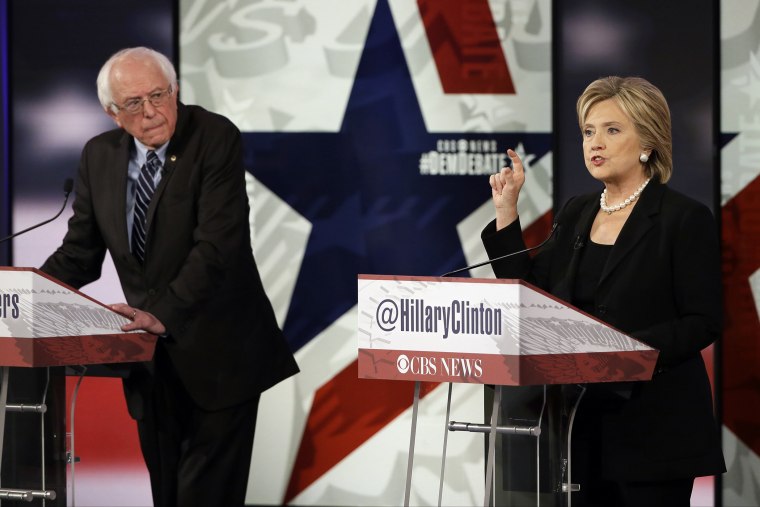Iowa Democrats will hold their presidential caucuses in 19 days, and it wasn't long ago that Hillary Clinton appeared well positioned to win with relative ease.
That's no longer the case. A Quinnipiac poll was released yesterday that found Bernie Sanders leading Clinton in the Hawkeye State, 49% to 44%. Public Policy Polling released results yesterday showing Clinton ahead, 46% to 40%, though the six-point margin is much tighter than her 18-point lead in a PPP poll in December. (A Des Moines Register/Bloomberg poll will be released tomorrow.)
In New Hampshire, meanwhile, most of the recent surveys show Sanders, competing in a state that neighbors his own, well positioned to win the first Democratic primary.
All of a sudden, it's dawning on much of the political world that the Vermont independent may win both of the first two nominating contests.
In the modern era, how many non-incumbent Democrats have won Iowa and New Hampshire in the same cycle? Just two: Al Gore and John Kerry. Both went on to win the party's nomination.
The question no longer seems ridiculous: if Bernie Sanders wins the first two states, should he be considered the frontrunner for the Democratic nomination?
The answer is, probably not, though it's a lot trickier than it seemed a few months ago. Slate's Josh Voorhees had a good piece on this the other day.
Even if Hillary staggers out of New Hampshire with her second loss in as many contests, she'll still have the same massive advantages she enjoys today: the campaign and super PAC cash, the ground game, the endorsements, the pledged superdelegates, and the general support of a party establishment that won't soon forget that her challenger is not technically even a part of the Democratic Party. An unexpected loss in Iowa and a less surprising one in New Hampshire wouldn't change that. She'd also have a chance to get back on her feet -- and fast. Consider what comes next: Nevada (Feb. 20) and South Carolina (Feb. 27), two significantly more diverse states than lily-white Iowa and lily-whiter New Hampshire.
The demographics of the first two nominating contests matter a great deal for providing context. FiveThirtyEight's Nate Silver published a piece back in July noting that Sanders is strongest in states where the universe of Democratic voters is very white and very liberal. Based on previous performance, that means the three best states in the Union for the senator are, in order, Vermont, New Hampshire, and Iowa.
The fact that two of those three just happen to go first is the electoral equivalent of the Sanders campaign pulling an inside straight.
The problem for Team Bernie, however, is that once those states come and go, the landscape shifts to less-friendly terrain: Clinton is in far better shape in states with more diverse populations. South Carolina polling, for example, shows the former Secretary of State up by more than 40 points.
Nevada is woefully under-polled, but the scant evidence that's available suggests she's favored there, too.
Some Sanders backers emphasize that victories in Iowa and New Hampshire, if they occur, don't happen in a vacuum -- voters in other early states will see his big wins, and the outcomes may have a direct influence on his performance elsewhere. After all, the argument goes, he'll have "momentum."
Perhaps. What's less clear is whether or not Sanders and his operation have the resources in place to compete as effectively outside of Iowa and New Hampshire, and are positioned to expand the senator's base of support beyond his core audience.
Voorhees' conclusion emphasized an underappreciated point: "[I]f Iowa and New Hampshire are must-wins for anyone, it's Sanders. Hillary can -- and likely would -- survive a slow start and still be the one standing on stage at the Democratic National Convention when the balloons come down this summer. Bernie, though, has no such margin of error."
